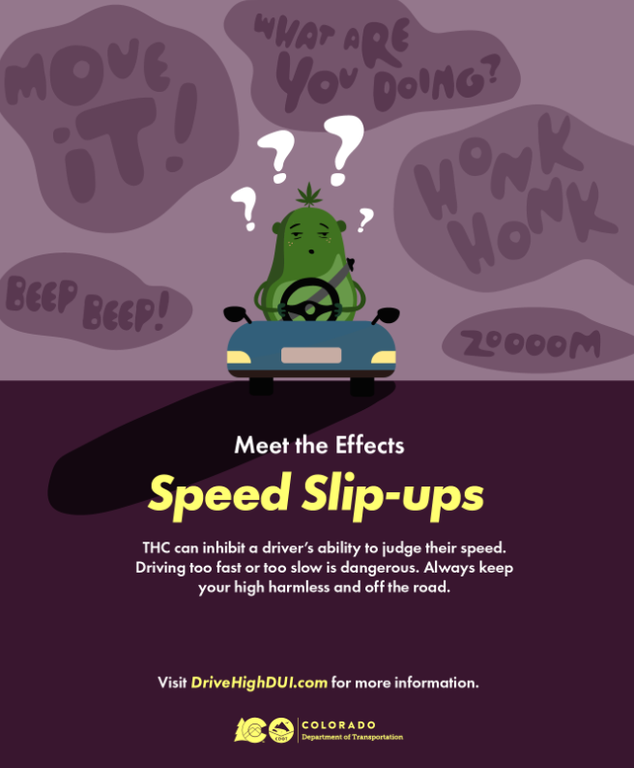CDOT’s safety guide for 420 celebrations
News Release
Guía de CDOT para celebrar con seguridad el 420 en español
Video, graphics and data assets for media are available by contacting [email protected].
Statewide — The Colorado Department of Transportation is reminding those partaking in cannabis-inspired events this April 20 to plan ahead, drive sober and use rideshare or other alternatives to driving impaired. Although the number of people who report driving after using cannabis is down, in 2022 there were 101 traffic deaths in Colorado that involved cannabis above the legal limit.
In the coming days Colorado will once again play host to an assortment of events such as 420 on the Rocks and The Mile High 420 Festival. As heavy cannabis consumption coincides with these events, CDOT is offering important planning and safety tips to consumers.
Drive High, Get a DUI
You can get a DUI for driving under the influence of cannabis, and the primary mode of detection is roadside impairment testing. CDOT, Colorado State Patrol (CSP) and statewide law enforcement agencies are currently conducting the Spring Events impaired-driving enforcement period through April 24.
The law states that if you are impaired to the slightest degree, you can be arrested — no matter what the substance. That is why Colorado law enforcement officers are increasingly trained to identify drivers impaired by alcohol, marijuana and other drugs. Colorado currently has 136 law enforcement certified as Drug Recognition Experts (DREs). In addition, many Colorado law enforcement officers have received special training in Advanced Roadside Impaired Driving Enforcement (ARIDE).Law enforcement officers base arrests on observed impairment.
Mixing Amplifies Impairment
Mixing cannabis and alcohol, or any other impairing substance, enhances the impairing effects of both and can be especially dangerous on the road.
Research shows that users are more likely to drive — or take other risks — after using both substances than after consuming marijuana alone. You can get a DUI even if you’re under the legal limit of both alcohol and cannabis. A report by the Colorado Division of Criminal Justice (DCJ) published in July 2023 analyzed 2020 data from more than 21,000 impaired driving cases filed in Colorado and found that 75% of people with Delta-9 THC detected in their system also had some other substance present. Alcohol and cannabis were the most common co-occurring substances. In 2022, 29% of the fatal crashes that tested for more than one drug tested positive for multiple impairing substances.
How Long to Wait
Everyone is different, and experience levels and consumption methods will impact your impairment. Here are some general guidelines:
- Wait at least six hours after smoking cannabis containing less than 35 mg of THC before driving or performing other safety-sensitive activities. If you’ve smoked more than 35 mg, you need to wait longer.
- Wait at least eight hours after eating or drinking cannabis containing less than 18 mg of THC before driving. If you’ve eaten more than 18 mg, wait longer.
- If you’re mixing cannabis with alcohol, you need to wait even longer.
- Given these long wait times, it is always best to plan ahead for a sober ride home.
Know What You’re Consuming
Delta-9 Tetrahydrocannabinol (Delta-9 THC) is the most commonly found psychoactive and impairing substance in cannabis products in Colorado. However, products sold at dispensaries, along with some sold on the general market, may also contain other cannabinoids like CBD, CBN, CBG or others. Some are psychoactive, some may not be, but don’t assume that if it’s not THC, it won’t impair your ability to drive.
“It is a big week for marijuana consumers in Colorado, and we want to prevent anyone from getting behind the wheel if they’ve been consuming cannabis, alcohol or other drugs,” said CDOT’s Office of Transportation Safety Director Darrell Lingk. “We’re asking everyone to celebrate responsibly. Driving high is illegal, and any amount of impairment puts you at risk for a DUI.”
CDOT’s Meet The Effects awareness campaign will be active in broadcast, digital, print and out-of-home media from April to June. The campaign educates consumers about marijuana-impaired driving by personifying how cannabis negatively impacts driving performance.

Crash Not Accident
Note to reporters: Crashes are no accident — they are preventable. We would appreciate you saying 'crash' instead of 'accident' when reporting.
